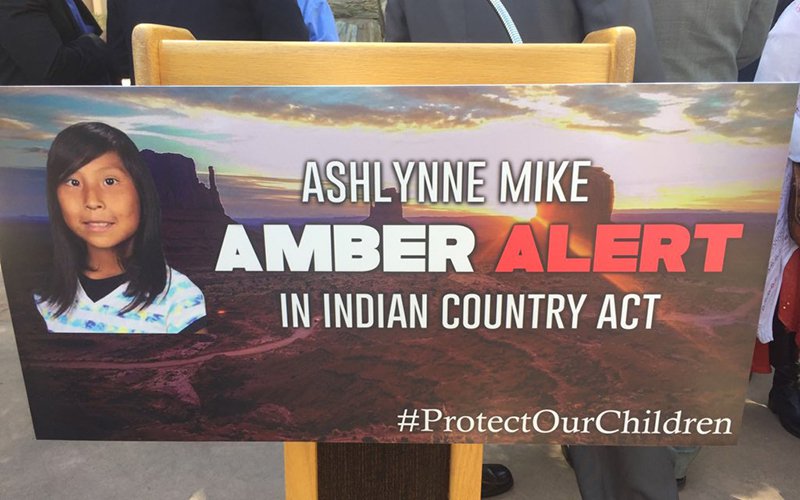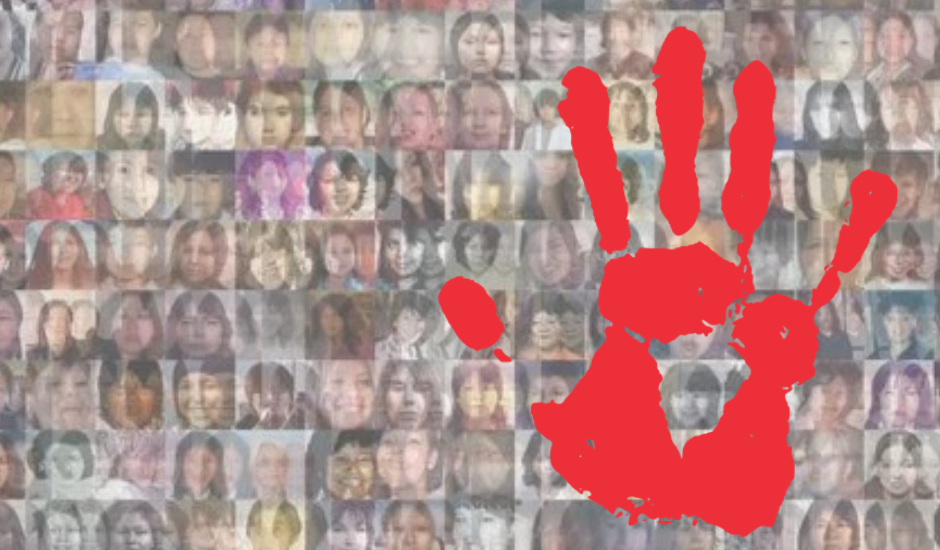
By Denise Gee Peacock
May 5 is designated as the National Day of Awareness for Missing and Murdered Indigenous Persons (MMIP)/Missing and Murdered Indigenous Women and Girls (MMIWG). The day serves as a national call to action to end violence against Indigenous communities and to support families and communities impacted by the MMIP/MMIWG crisis.
Funded by the U.S. Department of Justice in support of the Ashlynne Mike AMBER Alert in Indian County Act, the AMBER Alert Training & Technical Assistance Program’s AMBER Alert in Indian Country (AIIC) initiative is committed to helping American Indian and Alaska Native Villages (AI/AN communities) combat the crisis by providing no-cost training, technology assistance, and numerous resources.
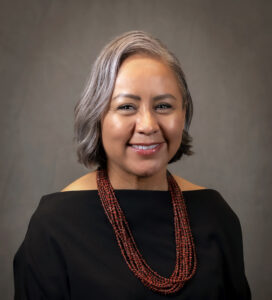
AMBER Alert in Indian Country Program Manager Tyesha Wood, and Project Coordinators Dave Chewiwie, Amy Hood-Schwindt, and Alica Murphy Wildcatt—are continually on the road meeting with federally recognized Tribes throughout the nation.
Their Indigenous heritage and law enforcement experience help them connect on multiple levels with AI/AN law enforcement and community leaders during AMBER Alert implementation meetings and child abduction tabletop exercises (CATEs). They also assist with specialized and/or customized training, partner outreach, and more.
“While our team proudly supports MMIP/MMIWG Awareness Day, our commitment extends beyond May 5,” says Program Manager Wood, a member of the Navajo Nation. “Every day we stand with the families of missing and murdered Indigenous people who are still seeking answers. We encourage everyone to listen and help people with cases that are unreported or under-investigated. Every voice matters—and every story deserves to be heard.”
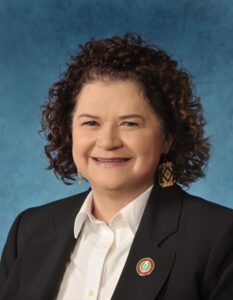
Behind every missing or murdered Indigenous relative “is a family waiting, a community grieving, and a life full of potential that deserves to be seen and protected,” says Wildcatt, a member of the Eastern Band of Cherokee Indians.
Much like her AIIC colleagues, “I see firsthand how our systems have the potential to fall short. Delayed responses, jurisdictional barriers, and a lack of urgency can put Native lives at risk. We can’t let our relatives become statistics. The MMIP/MMIWG movement matters because it is about justice, yes, but it’s also about love, dignity, and the right to be safe in our own homeland.”
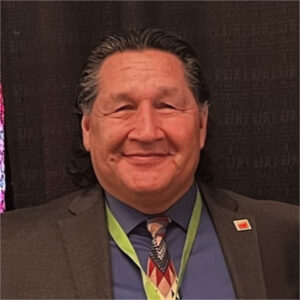
Children are precious in Native communities, but they also are vulnerable to “those who may be looking to abduct them, to exploit them,” says Project Coordinator Dave Chewiwie, a Pueblo of Isleta member. “We have to have effective programs and plans in place to safely recover them if they go missing. We are all stakeholders in the security of our children in Indian Country.”
Project Coordinator Hood-Schwindt, a Yavapai-Apache member, believes “an ongoing lack of thorough investigations into MMIP cases, combined with the impunity of perpetrators, has fueled a vicious cycle, one we need to break. We have to provide comprehensive investigations, meaningful prosecutions, and ensure there is justice for every stolen Indigenous life.”

While significant progress has been made in the last five years, much still needs to be done, Wood says. “We must work in unity, share resources and coordinate efforts, and carry hope that we will find, or find answers for, our missing and murdered Indigenous relatives.”
Wildcatt believes that “working together, we can confront this epidemic. We can invest in community-driven solutions, and build systems that ensure safety, accountability, and justice.”

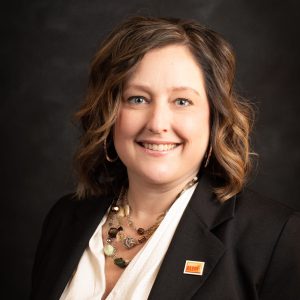 The disproportionately high rate of violence experienced by Native American families is unacceptable. Through continued collaboration with American Indian and Alaska Native Tribes, we are dedicated to alleviating this crisis in a meaningful—and lasting—way.
The disproportionately high rate of violence experienced by Native American families is unacceptable. Through continued collaboration with American Indian and Alaska Native Tribes, we are dedicated to alleviating this crisis in a meaningful—and lasting—way.
Administrator, AMBER Alert Training & Technical Assistance Program/AMBER Alert in Indian Country initiative
‘Not Afraid’
AIIC Associate Jen Murphy helped produce an award-winning short film that turns a lens on the MMIP/MMIW crisis.
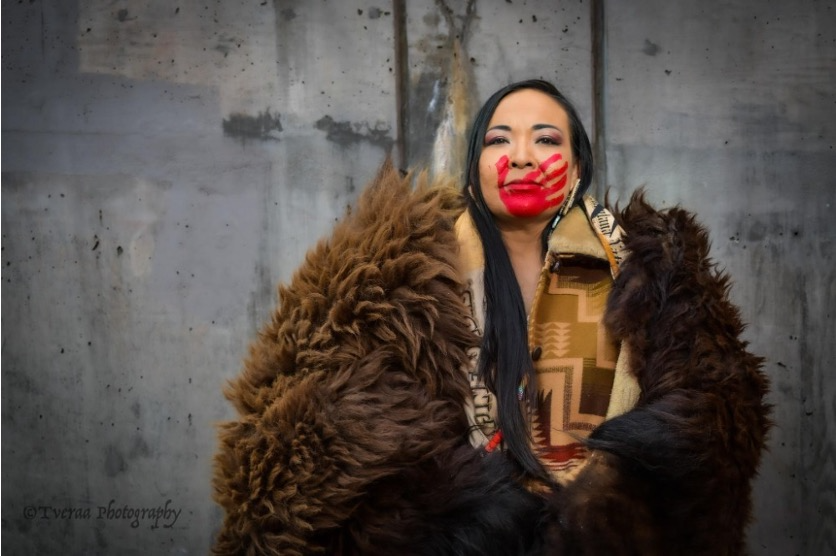
Jen Murphy is a photographer, artist, member of the Chippewa Cree Tribe in Montana, an AATTAP-AIIC Associate, and one of the more prominent faces of MMIP/MMIW awareness work. The above photograph of her with a red handprint over her mouth—symbolizing the silencing of voices—spans billboards across the Great Plains “to bring attention to issues that need to be talked about,” Murphy says.
Central among those issues is the disproportionate rate of violence, abduction, and murder experienced by women and people in the U.S. and Canada.
 Another way Murphy aims to turn people’s attention to the MMIP/MMIW crisis is through a new short film, for which she served as executive producer: “Not Afraid,” now streaming on Omeleto.
Another way Murphy aims to turn people’s attention to the MMIP/MMIW crisis is through a new short film, for which she served as executive producer: “Not Afraid,” now streaming on Omeleto.
At just under 10 minutes, the film provides an intimate and powerful portrait of a young Native American woman navigating the grief of losing a loved one to the MMIW crisis. It captures both personal heartbreak and the deep resilience within Indigenous communities, and aims to be a stirring call to remembrance, justice, and healing.
Starring JaShaun St. John (“Songs My Brothers Taught Me”), the film offers a powerful, intimate look at a growing injustice impacting Indigenous families across North America.
“Not Afraid” was awarded the Indigenous Film and Culture Award from Windrider Film Showcase that runs with the Sundance Film Festival.
The film’s director, Michaela Bruce, says of Murphy—and their storytelling mission—“I feel on the deepest level that we have a responsibility to support vulnerable women through all means available to us, including the arts.”
“When we have the ability and resources to support an important work,” Murphy adds, “it is always the right thing to do.”

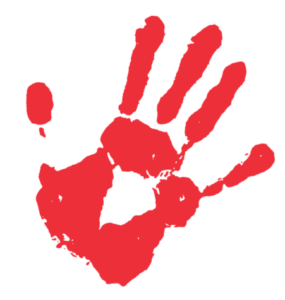 “The red hand over the mouth stands for all of our missing sisters who are not heard.”
“The red hand over the mouth stands for all of our missing sisters who are not heard.”
JEN MURPHY
AMBER Alert in Indian Country Associate / artist and filmmaker
Get the Facts About MMIP / MMIWG
Indigenous people—especially women and girls—experience significantly higher rates of violence, murder, and being reported missing compared to other groups.
- Find the latest statistics from the FBI here and view the National Criminal Justice Training center infographic (shown below right; click photo to enlarge).
- Learn more about national MMIP/MMIWG efforts here and here.
- Access the DOJ resource When a Loved One Goes Missing: Resources for Families of Missing American Indian and Alaska Native Adults (shown below left) here.
Moved to Act: AIIC Team Participates in Ashlynne Mike, MMIWG Events
Walking the Walk for Ashlynne Mike & MMIP/MMIWG Awareness
Alica Murphy Wildcatt, Project Coordinator for AATTAP’s AMBER Alert in Indian Country (AIIC) initiative, participated in the Ashlynne Mike Memorial Mile Walk & Run held in Shiprock, New Mexico, on May 2.
The event drew 111 people—the largest number of participants to date. Attendees walked and/or ran in honor of Ashlynne—namesake of the Ashlynne Mike AMBER Alert in Indian Country Act of 2018, which the AIIC initiative works to support.
The event also served to raise awareness of Missing and Murdered Indigenous Women & Girls (MMIWG) National Day of Awareness May 5.
“𝘛𝘩𝘦 𝘥𝘢𝘺 𝘸𝘢𝘴 𝘢 𝘱𝘰𝘸𝘦𝘳𝘧𝘶𝘭 𝘳𝘦𝘮𝘪𝘯𝘥𝘦𝘳 𝘰𝘧 𝘵𝘩𝘦 𝘸𝘰𝘳𝘬 𝘴𝘵𝘪𝘭𝘭 𝘯𝘦𝘦𝘥𝘦𝘥 𝘵𝘰 𝘱𝘳𝘰𝘵𝘦𝘤𝘵 𝘕𝘢𝘵𝘪𝘷𝘦 𝘤𝘩𝘪𝘭𝘥𝘳𝘦𝘯,” 𝘞𝘪𝘭𝘥𝘤𝘢𝘵𝘵 𝘴𝘢𝘺𝘴. “𝘞𝘦 𝘸𝘢𝘯𝘵 𝘵𝘰 𝘦𝘯𝘴𝘶𝘳𝘦 𝘵𝘩𝘦 𝘮𝘪𝘴𝘴𝘪𝘯𝘨 𝘢𝘳𝘦 𝘯𝘰𝘵 𝘧𝘰𝘳𝘨𝘰𝘵𝘵𝘦𝘯—𝘢𝘯𝘥 𝘵𝘩𝘦𝘪𝘳 𝘧𝘢𝘮𝘪𝘭𝘪𝘦𝘴’ 𝘷𝘰𝘪𝘤𝘦𝘴 𝘤𝘰𝘯𝘵𝘪𝘯𝘶𝘦 𝘵𝘰 𝘣𝘦 𝘩𝘦𝘢𝘳𝘥.”
AIIC Training & Resources Highlighted in Nevada
AIIC Project Coordinator David Chewiwie attended the Newe Waipaipian Missing and Murdered Indigenous Persons (MMIP) and Women (MMIW) Native Conference May 3–7 in Elko, Nevada. The conference drew numerous Indian Country Tribal leaders, Native advocates, law enforcement partners, and community members from throughout Nevada.
Chewiwie gave a presentation about the AIIC, and oversaw the information table for the National Criminal Justice Training Center/AMBER Alert Training & Technical Assistance Program/AIIC initiative, which provides a variety of free training, resources, and technological assistance to Native communities. (Learn more at here.)
“AMBER Alert in Indian country was very well received by conference organizers and attendees,” Chewiwie said. “We’ve already received an invitation to participate in next year's conference.”


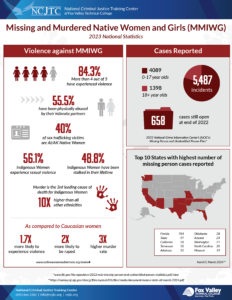

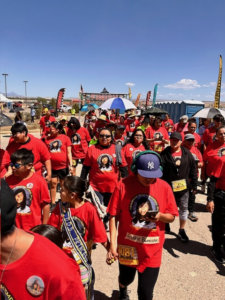
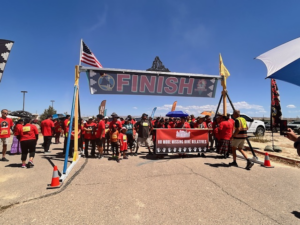
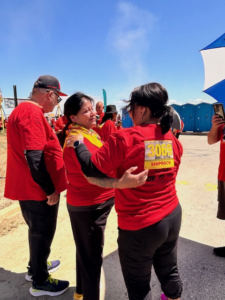







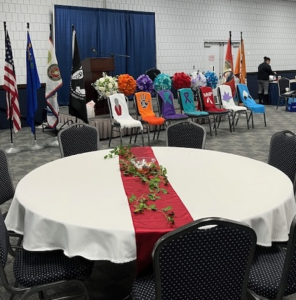
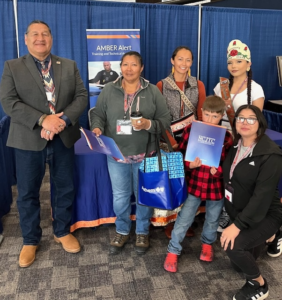
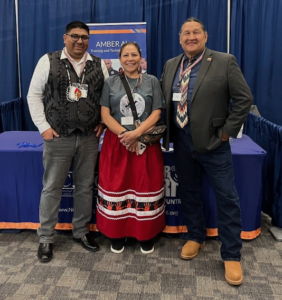
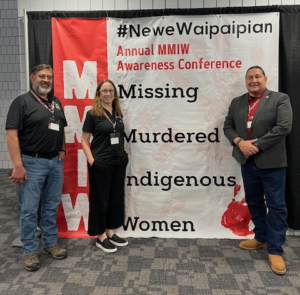
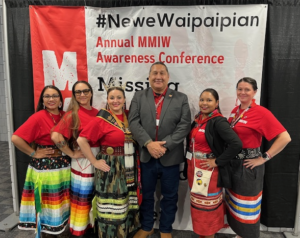
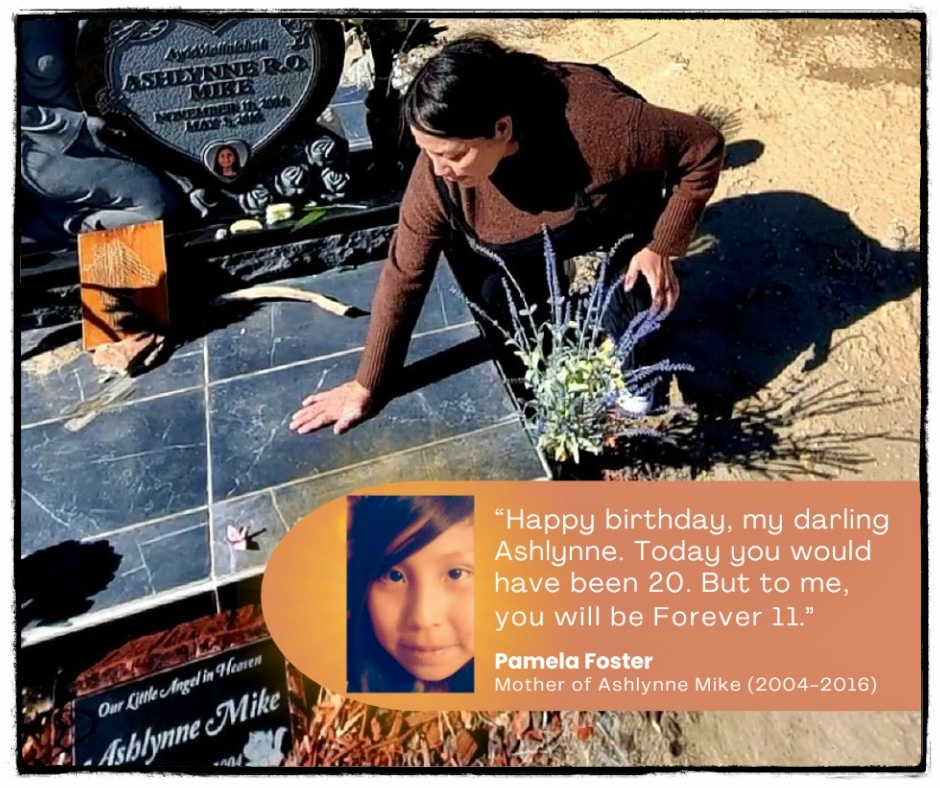 My dearest Ashlynne,
My dearest Ashlynne,